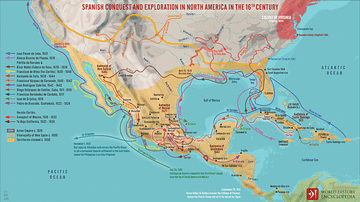Throughout history, the interpretation of the Spanish conquest in the Americas has undergone significant transformations. This pivotal event, which shaped both continents and their cultures, has been subject to varying perspectives and analyses. However, recent scholarship and a growing awareness of diverse voices have led to a reevaluation of this historical narrative. By delving into previously marginalized accounts and adopting a more inclusive approach, historians are shedding new light on the complexities and consequences of this epochal encounter.
A Multifaceted Encounter: Unveiling Untold Stories
The conventional understanding of the Spanish conquest often centered around European explorers’ triumphs and achievements. However, contemporary scholars are increasingly recognizing that this narrative neglects crucial aspects of indigenous experiences during colonization. By incorporating indigenous perspectives into historical analysis, researchers are uncovering untold stories that challenge traditional interpretations.
These alternative narratives highlight not only resistance but also collaboration between indigenous peoples and Europeans during colonization. They reveal complex power dynamics at play as well as instances where native populations actively participated in shaping their own destinies amidst foreign domination.
An Examination of Long-Term Effects: Beyond Immediate Consequences
Another aspect gaining prominence within modern interpretations is an exploration of long-term effects resulting from the Spanish conquest. While previous understandings focused primarily on immediate consequences such as political control or economic exploitation, current research expands beyond these limited scopes.
Scholars now delve into broader societal changes brought about by colonialism – examining shifts in cultural practices, religious beliefs, language use, social structures, and even ecological impacts caused by introduced species or altered land use patterns.
A Call for Inclusivity: Recognizing Diverse Perspectives
In recent years there has been a growing recognition of the need to include diverse perspectives in historical narratives. This shift towards inclusivity has allowed for a more comprehensive understanding of the Spanish conquest and its aftermath.
By incorporating voices from different ethnicities, genders, and social classes, historians are able to paint a more nuanced picture of this complex period. They acknowledge that multiple experiences coexisted during colonization and challenge monolithic interpretations that fail to capture the full extent of human agency and resilience.
Conclusion
The changing interpretation of the Spanish conquest in the Americas reflects an evolving understanding of history itself – one that embraces diversity, challenges traditional narratives, and seeks to uncover previously marginalized accounts. By delving into untold stories, examining long-term effects, and recognizing diverse perspectives, scholars are reshaping our comprehension of this pivotal event. Through their efforts, we gain deeper insights into the complexities and consequences surrounding this epochal encounter between two worlds.
